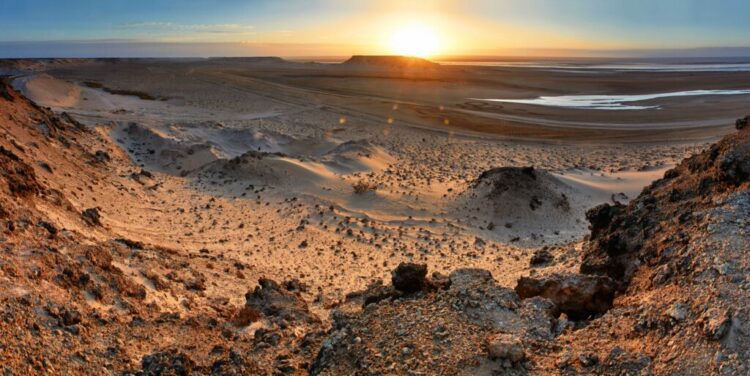Morocco and Algeria’s geopolitical rivalry has largely played out in the Western Sahara, where Algiers backs the Polisario against Rabat. As a territory over half of Morocco’s size, the Western Sahara issue has not only dominated Moroccan foreign policy but has always been tied to the legitimacy of the monarchy. For Algeria, the question of the Western Sahara is also tied to its own independence struggles, harkening back to feelings of betrayal and ultimately fear of Moroccan predation that linger on from the Sand War of 1963. In that regard, Algeria has viewed the Western Sahara conflict as a means to contain Morocco. Nevertheless, the Western Sahara’s usefulness as a buffer may be changing: Morocco’s diplomatic and political headway on the issue outside of the international UN process and generally more assertive foreign policy has diminished the sense that Rabat is mired in an ongoing morass. Morocco is no longer hampered by this issue at the regional or international level the way it was in the 1980s, 1990s or even the 2000s. Even the return to active fighting in November 2020 has not substantially changed that.
The Western Sahara Conflict
For the past two decades, the long-running conflict between Morocco and the Polisario over the Western Sahara’s sovereignty has been at an impasse. The UN has been negotiating an internationally sanctioned resolution to the conflict since the late 1970s. Major international inflection points have included the ceasefire of 1991 and the formation of the United Nations Mission for the Referendum in Western Sahara (MUNERSO) to lay the groundwork for a referendum through which Sahrawis would choose between independence or full integration with Morocco. In 2007, Morocco unilaterally proposed a third option of autonomy — where the Sahrawis would run their government under Moroccan sovereignty — and insisted it was the only outcome Rabat would accept. As the process dragged on, conditions on the ground shifted to reflect each side’s changing aspirations. This has made a solution harder to reach. The closest it came to a breakthrough was under James Baker, Personal Envoy of the UN Secretary-General for Western Sahara from 1997-2004. But Baker’s plans were eventually abandoned, and the process has been stalled since.[vii] There is little promise of a resolution on the horizon.
Over the years, both Morocco and the Polisario have seemed to find comfort in the status quo. The Polisario leadership (distinct from the Sahrawi refugees) founded a government and the Sahrawi Arab Democratic Republic (SADR) in exile in Algeria in the late 1970s and have continued to build upon their aspirations for an independent Western Sahara largely from exile. In the early days, the Polisario government benefited from both Libyan[viii] and Algerian support.[ix] Muammar Gaddafi’s Libya provided military training and weapons. Algeria continues to provide diplomatic support and hosts the SADR government in exile and camps to host the refugee population. While Gaddafi’s support for the Polisario waned in the 1990s and ended with the collapse of his regime in 2011, Algeria remains the Polisario government’s main political and diplomatic supporter. Meanwhile, refugee generations in Tindouf live a subsistence life often bereft of basic commodities and services.[x]
Similarly, Morocco has also set about establishing its own reality in the Western Saharan territories—come what may of the international negotiations. In the years of active fighting, especially in the 1980s, Morocco began to gain control over most of the territories and ensured the defence of the area with the construction of a berm. That berm has become a demarcation of Moroccan-controlled areas versus what is often referred to as the disputed lands that Polisario forces can access and patrol. Since then, the Moroccan government has established an absolute presence in the territory it has control over, pursuing accelerated development and investment plans. The area is home to a diverse group that includes Sahrawi who have come to embrace, oppose or distrust Moroccan sovereignty; military personnel stationed there over the decades and their families; and people who have gradually migrated to the area in search of jobs and opportunities as the rate of urbanisation and development increased. All the while, Morocco has also pursued its own diplomatic solutions.
Morocco’s strategy of securing bilateral recognition of its sovereignty claims over the Western Sahara has allowed it to sidestep the stalled international process and actualise its preferred outcome. The Trump administration’s recognition of Morocco’s claims in December 2020 fits in this category.[xi] Given the sheer diplomatic weight of the United States, this recognition tilted the scales further in Morocco’s favour, necessitating action first from the Polisario and then Algeria. Prior to the recognition, in November 2020, the ceasefire broke down and the international process collapsed into a further impasse.[xii] Soon after, the diplomatic break dealt another blow to the prospect of negotiations.
Morocco beyond the Western Sahara
Morocco’s strategy toward the Western Sahara has been bolstered by Rabat’s efforts to be more “present” on the African stage. In the 1980s and 1990s, Morocco’s role in the engagement between Maghreb Sahel or northern sub-Saharan African states was overshadowed by Algeria and Libya and tainted by the Western Sahara conflict, especially in institutional structures like the African Union that are defined by their anti-imperialism and anti-colonialism.
Source link : https://manaramagazine.org/2023/02/algeria-morocco-and-western-sahara-why-tension-not-conflict-has-become-the-norm/
Author :
Publish date : 2023-02-16 08:00:00
Copyright for syndicated content belongs to the linked Source.
